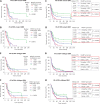Predictive value of MGMT promoter methylation on the survival of TMZ treated IDH-mutant glioblastoma
- PMID: 33628600
- PMCID: PMC7877176
- DOI: 10.20892/j.issn.2095-3941.2020.0179
Predictive value of MGMT promoter methylation on the survival of TMZ treated IDH-mutant glioblastoma
Abstract
Objective: O6methylguanine-DNA methyltransferase (MGMT) promoter methylation is a biomarker widely used to predict the sensitivity of IDH-wildtype glioblastoma to temozolomide therapy. Given that the IDH status has critical effects on the survival and epigenetic features of glioblastoma, we aimed to assess the role of MGMT promoter methylation in IDH-mutant glioblastoma.
Methods: This study included 187 IDH-mutant glioblastomas and used 173 IDH-wildtype glioblastomas for comparison. Kaplan-Meier curves and multivariate Cox regression were used to study the predictive effects.
Results: Compared with IDH-wildtype glioblastomas, IDH-mutant glioblastomas showed significantly higher (P < 0.0001) MGMT promoter methylation. We demonstrated that MGMT promoter methylation status, as determined by a high cutoff value (≥30%) in pyrosequencing, could be used to significantly stratify the survival of 50 IDH-mutant glioblastomas receiving temozolomide therapy (cohort A); this result was validated in another cohort of 25 IDH-mutant glioblastomas (cohort B). The median progression-free survival and median overall survival in cohort A were 9.33 and 13.76 months for unmethylated cases, and 18.37 and 41.61 months for methylated cases, and in cohort B were 6.97 and 9.10 months for unmethylated cases, and 23.40 and 26.40 months for methylated cases. In addition, we confirmed that the MGMT promoter methylation was significantly (P = 0.0001) correlated with longer OS in IDH-mutant patients with GBM, independently of age, gender distribution, tumor type (primary or recurrent/secondary), and the extent of resection.
Conclusions: MGMT promoter methylation has predictive value in IDH-mutant glioblastoma, but its cutoff value should be higher than that for IDH-wildtype glioblastoma.
Keywords: Glioblastoma; O6methylguanine-DNA methyltransferase; isocitrate dehydrogenase; pyrosequencing; temozolomide.
Copyright: © 2021, Cancer Biology & Medicine.
Conflict of interest statement
Conflict of interest statement No potential conflicts of interest are disclosed.
Figures




References
-
- Jiang T, Mao Y, Ma W, Mao Q, You Y, Yang X, et al. CGCG clinical practice guidelines for the management of adult diffuse gliomas. Cancer Lett. 2016;375:263–73. - PubMed
-
- Chai RC, Liu YQ, Zhang KN, Wu F, Zhao Z, Wang KY, et al. A novel analytical model of MGMT methylation pyrosequencing offers improved predictive performance in patients with gliomas. Mod Pathol. 2019;32:4–15. - PubMed
-
- Esteller M, Garcia-Foncillas J, Andion E, Goodman SN, Hidalgo OF, Vanaclocha V, et al. Inactivation of the DNA-repair gene MGMT and the clinical response of gliomas to alkylating agents. N Engl J Med. 2000;343:1350–4. - PubMed
-
- Hegi ME, Diserens AC, Gorlia T, Hamou MF, de Tribolet N, Weller M, et al. MGMT gene silencing and benefit from temozolomide in glioblastoma. N Engl J Med. 2005;352:997–1003. - PubMed
Publication types
MeSH terms
Substances
LinkOut - more resources
Full Text Sources
Other Literature Sources
Medical
Research Materials
